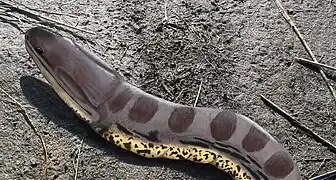Coloraderpeton
Coloraderpeton is an extinct genus of aïstopod tetrapodomorphs within the family Oestocephalidae.[1][2] Coloraderpeton is known from the Carboniferous Sangre de Cristo Formation of Colorado, and was initially known from vertebrae, ribs, and scales recovered from a UCLA field expedition in 1966. Peter Paul Vaughn described these remains in 1969.[1] A skull was later reported in an unpublished 1983 thesis and formally described by Jason S. Anderson in 2003.[2]
| Coloraderpeton Temporal range: Late Carboniferous, | |
|---|---|
 | |
| Life restoration | |
| Scientific classification | |
| Domain: | Eukaryota |
| Kingdom: | Animalia |
| Phylum: | Chordata |
| Clade: | Sarcopterygii |
| Clade: | Tetrapodomorpha |
| Order: | †Aistopoda |
| Family: | †Oestocephalidae |
| Genus: | †Coloraderpeton Vaughn, 1969 |
| Species: | †C. brilli |
| Binomial name | |
| †Coloraderpeton brilli Vaughn, 1969 | |
References
- Vaughn, Peter Paul (26 June 1969). "Upper Pennsylvanian vertebrates from the Sangre de Cristo Formation of Central Colorado" (PDF). Los Angeles County Museum Contributions in Science. 164: 1–28. Archived from the original (PDF) on 29 June 2016. Retrieved 22 February 2019.
- Anderson, J. S. (2003). "Cranial anatomy of Coloraderpeton brilli, postcranial anatomy of Oestocephalus amphiuminus, and reconsideration of Ophiderpetontidae (Tetrapoda: Lepospondyli: Aistopoda)". Journal of Vertebrate Paleontology. 23 (3): 532–543. doi:10.1671/1752.
This article is issued from Wikipedia. The text is licensed under Creative Commons - Attribution - Sharealike. Additional terms may apply for the media files.
.jpg.webp)




